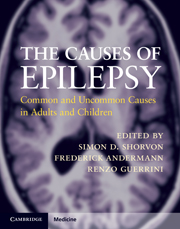Book contents
- The Causes of Epilepsy
- The Causes of Epilepsy
- Copyright page
- Contents
- Contributors
- Foreword
- Preface – an act of supererogation?
- Section 1 Introduction
- Section 2 Idiopathic epilepsy
- Chapter 5 Introduction to the concept of genetic epilepsy
- Chapter 6 The genetic contribution to epilepsy: the known and missing heritability
- Chapter 7 Benign familial neonatal seizures
- Chapter 8 Autosomal dominant nocturnal frontal lobe epilepsy
- Chapter 9 Genetic epilepsy with febrile seizures plus
- Chapter 10 Severe myoclonic epilepsy of infancy or Dravet syndrome
- Chapter 11 Benign adult familial myoclonic epilepsy
- Chapter 12 Idiopathic generalized epilepsies
- Chapter 13 Benign partial epilepsies of childhood
- Section 3 Symptomatic epilepsy
- Section 4 Provoked epilepsies
- Section 5 Status epilepticus
- Index
- Plate Section
Chapter 9 - Genetic epilepsy with febrile seizures plus
from Section 2 - Idiopathic epilepsy
Published online by Cambridge University Press: 05 March 2012
- The Causes of Epilepsy
- The Causes of Epilepsy
- Copyright page
- Contents
- Contributors
- Foreword
- Preface – an act of supererogation?
- Section 1 Introduction
- Section 2 Idiopathic epilepsy
- Chapter 5 Introduction to the concept of genetic epilepsy
- Chapter 6 The genetic contribution to epilepsy: the known and missing heritability
- Chapter 7 Benign familial neonatal seizures
- Chapter 8 Autosomal dominant nocturnal frontal lobe epilepsy
- Chapter 9 Genetic epilepsy with febrile seizures plus
- Chapter 10 Severe myoclonic epilepsy of infancy or Dravet syndrome
- Chapter 11 Benign adult familial myoclonic epilepsy
- Chapter 12 Idiopathic generalized epilepsies
- Chapter 13 Benign partial epilepsies of childhood
- Section 3 Symptomatic epilepsy
- Section 4 Provoked epilepsies
- Section 5 Status epilepticus
- Index
- Plate Section
Summary
- Type
- Chapter
- Information
- The Causes of EpilepsyCommon and Uncommon Causes in Adults and Children, pp. 74 - 77Publisher: Cambridge University PressPrint publication year: 2011

